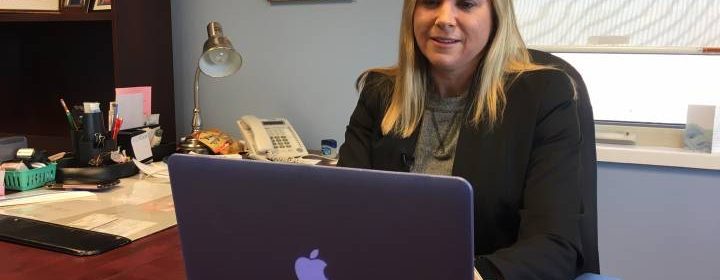PEI’s ‘television doctors’ could mark new tech trend in Canadian healthcare

In Alberton, Prince Edward Island, the doctor is not in the house.
Apparently, though, that’s okay — because it leaves room for an innovative approach in easing a local healthcare crisis.
“We’re here to visit,” says a nurse at Western Hospital, as she wheels a cart into Gloria Ellsworth’s room.
“Good morning,” says Ellsworth, a quadriplegic recovering from a bone infection.
The doctor, Kristy Newson, is on a monitor that sits atop the cart, conducting hospital rounds over the internet.
“Hi, Gloria, how was your night?” Dr. Newson asks.
“It was good,” Ellsworth replies.
The consultation is a form of telemedicine, a service tailored to rural hospitals that don’t have enough family doctors to see patients in person.
Dr. Kristy Newson (pictured) is one of Prince Edward Island’s ‘television doctors.’
In this first-of-its-kind pilot project, some doctors are located as far away as Toronto, while others, like Dr. Newson, are two hours away in Charlottetown.
“They call us the ‘television doctors,’” Dr. Newson chuckles.
“But really, I’m surprised — especially with the elderly population — how eager they are to talk to me.”
For Ellsworth, the “TV doctor” works just fine.
“I think it’s great,” she says. “Better than seeing no-one.”
Fred Butler, whose pneumonia forced him to spend two weeks at the hospital, also likes the arrangement — even though it was at first a big adjustment.
Butler says having no doctor come around “kind of shocked me.”
The Toronto-based provider of the technology, a company called Maple, says there are multiple safeguards in place to protect patients’ medical information.
Western Hospital’s administrator, Paul Young, says telemedicine such as what Newson offers is having a positive domino effect, by taking the strain off other doctors.
“The two physicians that are currently seeing their own patients have the ability — for the first time, after working seven days a week [for] very long hours — to take a breather,” Young said.
The practice is meant to be temporary at the hospital for six months, allowing two newly-hired doctors to transition into their roles in the Alberton area. But as Maple CEO Dr. Brett Belchetz says, there are bigger plans in other parts of Canada.
“We would like this to go to a place where never again does a rural hospital have to close because there are no doctors on the ground,” Belchetz said.
“Never again do we have to spend tens of thousands of dollars to fly in a doctor every week to keep a northern hospital open.”
Source: Read Full Article
